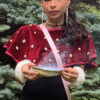By Christianna Alexiou and Cameron Chaddad
When COVID-19 cut off in-person sales, small business owner Paula Naponse accelerated her transition to selling her hand screen-printed apparel and accessories online – turning what was previously a hobby into a full-time job.
She owns Ondarez Clothing and Goods, which specializes in clothing featuring Naponse’s designs as well as candles, coffee and accessories such as tote bags. Prior to the pandemic, Naponse’s sales came through a combination of her online store and in-person events.
(Sponsored)

Borden Ladner Gervais LLP and partners lead with generosity
Borden Ladner Gervais LLP (BLG) are no strangers to supporting charities in the nation’s capital. From the Boys & Girls Club of Ottawa to Crohn’s and Colitis Canada to the

OBJ launches the 2026 Executive Report on Cornwall
Cornwall has emerged as one of Eastern Ontario’s most compelling locations for business investment, thanks to a combination of affordability, strategic positioning, and a steadily growing economic base.
When COVID-19 halted physical gatherings and temporarily shuttered storefronts, many small business owners feared their sales would take a hit. But for Naponse, the opposite happened: her sales, which had been hovering around $20,000 annually prior to the pandemic, nearly doubled.
“There’s been a big push on supporting (small) businesses and even Indigenous businesses,” Naponse said. “COVID sucks, but at the same time, it brought in a lot of business. I’m so busy – it’s crazy.”
The uptick in online sales was driven in part by Naponse’s push to make new connections with customers – who are primarily Indigenous peoples, non-Indigenous women and those who support Indigenous businesses – at online events.
From August 2020 to February 2021, sales of candles more than doubled to 1,000 while sales of her “good life” planners – which help individuals set goals and map out their work/life balance – grew to 2,000 units, up from only 100 the year before.
Ondarez has also benefited from a greater interest among consumers in supporting Indigenous businesses, Naponse said. The company’s name is a play on words of “on the rez,” a term some Indigenous peoples use when referring to life on a reserve.
“That’s where I come from, that’s where I grew up,” Naponse said. “I’m always trying to say that that’s a good place; it’s not necessarily negative.”
Navigating challenges
Ondarez is not the only Indigenous business that has grown its online sales during the pandemic.

Aunt and niece beadwork artisans Laurel Thomas and Niquita Lynne, who identify as Iroquois, say they’re passionate about keeping their traditions alive and rely heavily on online sales to support their businesses.
Thomas sells through an online collective for Indigenous artists called Pass The Feather and Lynne relies heavily on her Instagram page to showcase and sell her work.
During the pandemic, Lynne estimates she has sold between 200 to 250 pieces and Thomas has sold roughly 146.
However, the pandemic has posed some challenges for some Indigenous artists. Ali Dusome, a grade one French immersion teacher who identifies as Métis, takes great pride in her beadwork – something she has just started to sell.
However, she said it’s been difficult to find the materials she needs amid the pandemic. She prefers to support local businesses, but the on-again, off-again government-imposed closures of non-essential businesses has created challenges sourcing materials, Dusome said.
Another challenge facing artists is balancing their efforts to grow sales while navigating concerns surrounding the appropriation of Indigenous culture.
There are some items that are too personal and can lead to cultural appropriation if used for the wrong reasons, Dusome explained.
“Earrings and little bracelets … (are) safe for everyone to wear,” she said. “(But) there are certain things that I probably just wouldn’t make for a stranger, like a medicine pouch. I would bead that for a family member. It’s really personal, it should be kind of treated as a sacred item.”
Lynne and Thomas have also grappled with this issue. They say the key is for customers to respect the underlying culture behind their products.
“For me, I think it’s great that non-Indigenous people are experiencing Indigenous culture in respectful ways, and I do encourage that because it also brings awareness to other social issues that we face,” Thomas said.






